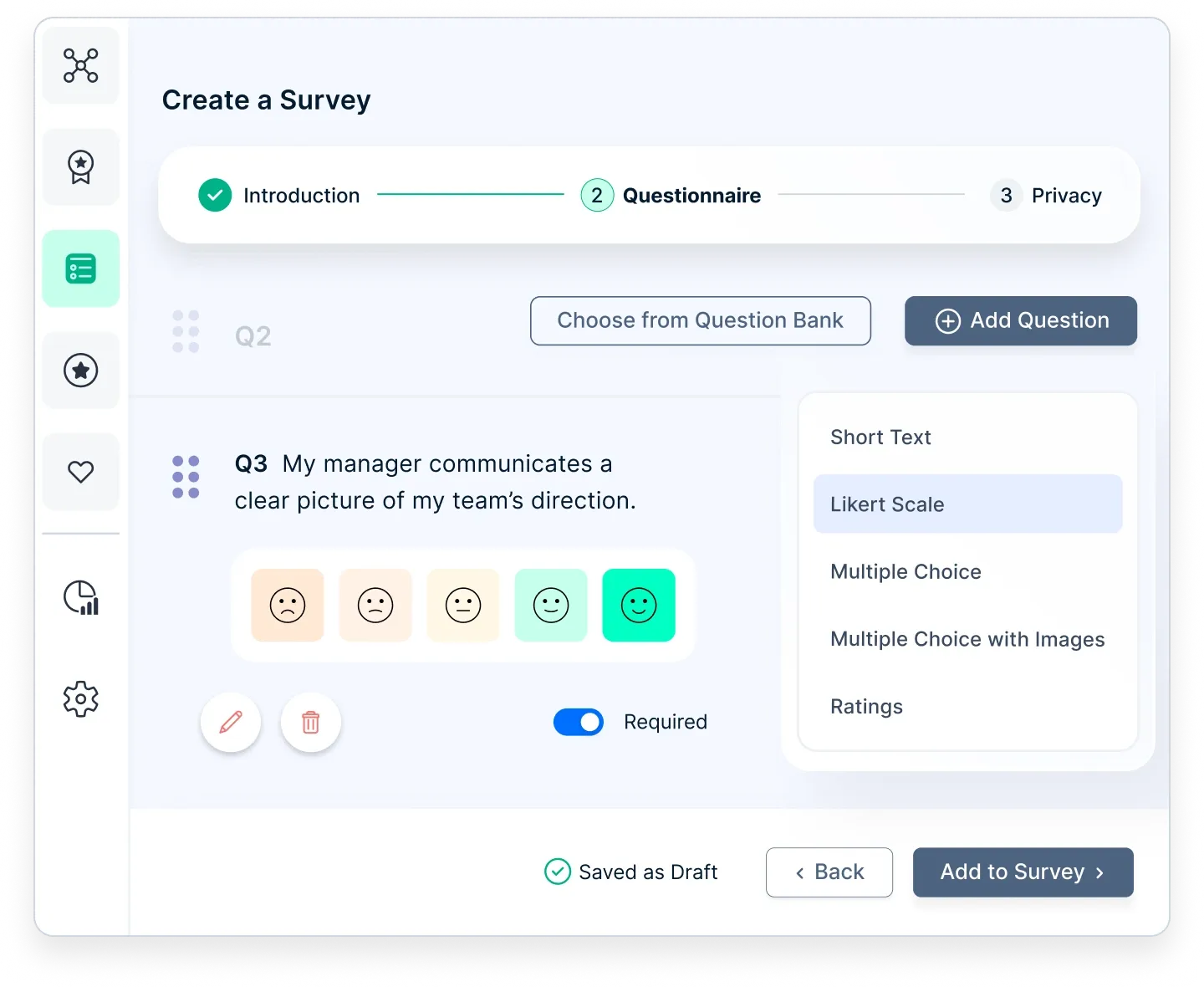70 domande essenziali di peer review per valutazioni efficaci dei dipendenti
Cercate le migliori domande di peer review dei dipendenti per valutazioni efficaci? Ecco le 70 domande più importanti da porre durante il processo di peer review.
In questa pagina
- Cosa sono le valutazioni dei dipendenti?
- Perché è importante condurre valutazioni paritetiche dei dipendenti?
- 70 Domande di valutazione tra pari dei dipendenti per migliorare la crescita sul posto di lavoro
- Suggerimenti per la preparazione delle domande di valutazione dei dipendenti
- Semplificate le valutazioni dei dipendenti con Empuls
- Riflessioni finali
- Domande frequenti
Le valutazioni inter pares dei dipendenti possono essere un potente strumento per migliorare le prestazioni del team e creare una forza lavoro più impegnata e produttiva. Se effettuate correttamente, le valutazioni tra pari rappresentano una preziosa opportunità per i membri del team di offrire un feedback e identificare le aree di crescita e sviluppo.
Tuttavia, la creazione di domande pratiche per la peer review può essere una sfida. È essenziale porre le domande giuste, in grado di suscitare un feedback onesto e costruttivo che possa essere utilizzato per promuovere un cambiamento significativo.
In questo blog, 70 domande di peer review dei dipendenti riguardano vari argomenti, dalla comunicazione e collaborazione alla leadership e alla qualità del lavoro.
Sia che siate un manager o un team leader che vuole migliorare le prestazioni del proprio gruppo, sia che siate un dipendente che vuole fornire un feedback ai propri colleghi, queste domande costituiranno un utile punto di partenza per il processo di peer review.
Cosa sono le valutazioni dei dipendenti?
La peer review dei dipendenti è un processo di feedback in cui i colleghi valutano le prestazioni, i contributi e le interazioni sul posto di lavoro degli altri. A differenza delle valutazioni tradizionali condotte dai manager, le valutazioni tra pari forniscono spunti di riflessione ai membri del team che lavorano a stretto contatto, offrendo una valutazione più completa dei punti di forza, delle capacità di collaborazione e delle aree di miglioramento di un dipendente.
Le valutazioni tra pari aiutano le organizzazioni a promuovere una cultura della trasparenza, dell'apprendimento continuo e del lavoro di squadra, assicurando che i dipendenti ricevano un feedback costruttivo da coloro che vivono direttamente il loro lavoro e il loro comportamento professionale.
Perché è importante condurre valutazioni paritetiche dei dipendenti?
Le valutazioni inter pares dei dipendenti sono fondamentali per creare un ambiente di lavoro trasparente e orientato al feedback. A differenza delle valutazioni condotte dai manager, le valutazioni tra pari offrono spunti di prima mano da parte di colleghi che interagiscono quotidianamente, rendendo il feedback più pertinente e perseguibile.
- Fornisce una prospettiva a 360 gradi: Le valutazioni tra pari integrano le tradizionali valutazioni delle prestazioni offrendo un feedback da diversi livelli di interazione, garantendo una valutazione a tutto tondo dei contributi di un dipendente.
- Migliora la collaborazione e il lavoro di squadra: Quando i dipendenti si valutano a vicenda, sviluppano una comprensione più profonda del lavoro di squadra, degli stili di comunicazione e delle responsabilità condivise, rafforzando le relazioni sul posto di lavoro.
- Incoraggia la crescita professionale: Il feedback onesto dei colleghi evidenzia i punti di forza e le aree di miglioramento, aiutando i dipendenti a concentrarsi sullo sviluppo delle competenze e sulla crescita professionale.
- Riduce i pregiudizi dei manager: poiché le revisioni tra pari provengono da più colleghi, forniscono una valutazione più equilibrata ed equa, riducendo il rischio di valutazioni distorte o unilaterali.
- Promuove una cultura del feedback continuo: Le revisioni paritetiche regolari creano un ambiente aperto in cui i dipendenti si sentono a proprio agio nel dare e ricevere feedback, con conseguente aumento dell'impegno e della responsabilità.
Incorporando le valutazioni tra pari nel processo di valutazione delle prestazioni, le organizzazioni consentono ai dipendenti di imparare gli uni dagli altri, di migliorare le dinamiche sul posto di lavoro e di promuovere il successo generale del team.

Migliorare le revisioni paritetiche con Empuls
Empuls rende le revisioni paritetiche semplici grazie a sondaggi automatizzati e analisi approfondite. Raccogliete feedback strutturati, migliorate la collaborazione e promuovete una cultura di crescita continua. Iniziate a usare Empuls oggi stesso.
70 Domande di valutazione tra pari dei dipendenti per migliorare la crescita sul posto di lavoro
Le valutazioni inter pares dei dipendenti forniscono indicazioni preziose sul lavoro di squadra, sulla comunicazione e sull'efficacia dell'ambiente di lavoro. Ponendo le domande giuste, le organizzazioni possono identificare i punti di forza, affrontare le aree di miglioramento e creare un ambiente di lavoro più collaborativo e performante.
Domande comuni sulla valutazione tra pari dei dipendenti
Le domande più importanti per la valutazione dei dipendenti si concentrano su collaborazione, comunicazione, responsabilità e crescita professionale. Queste domande aiutano i dipendenti a ottenere un feedback costruttivo dai colleghi, promuovendo una cultura di trasparenza, lavoro di squadra e miglioramento continuo.
1. Quali sono i punti di forza di questo dipendente?
2. Cosa dovrebbe fare questo dipendente?
3. [Se foste voi quel leader, quale sarebbe la prima cosa che fareste?
4. Quali tre o quattro parole usereste per descrivere questo dipendente?
5. In che misura questa persona si adatta a priorità mutevoli?
6. In quale area volete che questa persona migliori?
Esempio
- "Questa persona riesce a stabilire le priorità del proprio carico di lavoro e a rispettare le scadenze".
- "Questa persona comunica in modo chiaro ed efficace con me e con gli altri colleghi".
9. Cosa dovrebbe smettere di fare questo dipendente?
Esempio:
- "Questa persona ha forti capacità di leadership".
- "Questa persona ha forti capacità di comunicazione e aiuta tutti a sentirsi benvenuti nel team".
10. Fornite un esempio del valore aziendale apportato da questa persona.
Esempio
- "Questa persona fornisce sempre un feedback in modo tempestivo ed efficiente".
- "Questa persona preferisce il lavoro di squadra sopra ogni altra cosa".
11. Cosa dovrebbe continuare a fare questo dipendente?
Esempio
- "Questa persona trova sempre soluzioni creative ed è proattiva nel risolvere i problemi".
- "Questo dipendente è sempre aperto a feedback sia negativi che positivi".
12. In che misura questa persona riesce a gestire il proprio tempo e il proprio carico di lavoro?
Esempio
- "Questa persona incarna fortemente i nostri valori aziendali".
- "Questa persona apprezza i diversi punti di vista, anche se differiscono dai suoi".
13. Quanto efficacemente il suo collega ha contribuito ai progetti e agli obiettivi del team?
14. Il vostro collega è stato affidabile nel rispettare le scadenze e nel completare i compiti assegnati?
15. In che misura il suo collega ha comunicato con i membri del team e con gli altri reparti?
16. I suoi colleghi hanno collaborato efficacemente con altri o hanno lavorato in modo indipendente?
17. Il vostro collega ha dimostrato una forte capacità di risolvere i problemi?
18. Il vostro collega è stato proattivo nel cercare feedback e nel migliorare il proprio lavoro?
19. Il vostro collega si è appropriato del suo lavoro e si è assunto la responsabilità dei suoi errori?
20. In che misura il vostro collega si è adattato ai cambiamenti e ha gestito le situazioni difficili?
21. Il vostro collega ha fornito un feedback costruttivo e un supporto ai suoi colleghi?
22. Il vostro collega ha dimostrato un atteggiamento positivo e ha contribuito a creare un ambiente di lavoro positivo?
23. Il vostro collega è stato rispettoso e professionale nelle sue interazioni con gli altri?
24. Il vostro collega ha dimostrato forti capacità di leadership quando necessario?
25. In che misura il suo collega è riuscito a gestire il suo tempo e il suo carico di lavoro?
26. Il vostro collega ha dimostrato una forte attenzione ai dettagli e ha prodotto un lavoro di alta qualità?
27. Il vostro collega era aperto ad apprendere nuove competenze e ad affrontare nuove sfide?
28. Il vostro collega si è impegnato nella sua crescita personale e professionale?
29. Il collega ha cercato attivamente di sviluppare e mantenere relazioni positive con i membri del team e i manager?
30. Il vostro collega ha dimostrato forti capacità organizzative?
31. Il vostro collega ha dimostrato una forte etica del lavoro e un impegno verso gli obiettivi e i valori dell'organizzazione?
32. Il suo collega ha contribuito a creare una cultura dell'innovazione e della creatività sul posto di lavoro?
Domande di feedback tra pari
Il feedback dei colleghi aiuta i dipendenti a capire come i colleghi percepiscono i loro punti di forza, le capacità di collaborazione e le aree di miglioramento.
Promuove una cultura di apprendimento continuo, lavoro di squadra e responsabilità, assicurando che i dipendenti contribuiscano positivamente ai loro team. Ecco dieci domande essenziali da includere in un processo di peer review.
33. Cosa sto facendo bene in questo momento e dove posso migliorare?
34. Ritiene che interagisca abbastanza con i miei compagni di squadra?
35. Come posso aiutarla a svolgere il suo lavoro in modo più efficace?
36. Quali abilità posso affinare per diventare un dipendente migliore?
37. Può darmi un'illustrazione particolare di dove eccello?
38. Può illustrarmi concretamente dove posso migliorare?
39. Cosa mi distingue dagli altri membri della squadra?
40. Vedete dei buchi nella mia professionalità?
41. Avete qualche idea in più?
42. Quanto efficacemente questo dipendente collabora con gli altri?
43. In che misura il collaboratore comunica idee e feedback?
44. Il dipendente dimostra affidabilità e responsabilità nel suo lavoro?
45. Quanto è in grado questo dipendente di gestire un feedback costruttivo?
46. Il dipendente contribuisce positivamente al morale e alla cultura del team?
47. Come gestisce i conflitti o i disaccordi con i colleghi?
48. Il dipendente si impegna al massimo per aiutare i colleghi?
49. Quanto efficacemente questo dipendente si adatta ai cambiamenti e alle nuove sfide?
50. Si sentirebbe sicuro di lavorare con questo dipendente su progetti futuri? Perché?
51. Qual è un'area in cui questo dipendente può migliorare e come?
Queste domande di feedback tra pari aiutano i team a identificare i punti di forza, a migliorare la collaborazione e a incrementare l'efficacia complessiva dell'ambiente di lavoro, portando a una forza lavoro più impegnata e performante.
Domande essenziali per la valutazione inter pares a 360 gradi
Le valutazioni inter pares a 360 gradi forniscono una valutazione completa delle prestazioni, della collaborazione e della crescita professionale di un dipendente da più punti di vista. Queste valutazioni aiutano le organizzazioni a identificare i punti di forza, le aree di miglioramento e le dinamiche complessive del team, raccogliendo il feedback di colleghi, manager e subordinati. Di seguito sono riportate dieci domande essenziali per ottenere approfondimenti significativi da includere in un processo di peer review 360.
52. In che misura il collaboratore è in grado di gestire il feedback e di applicarlo al proprio lavoro?
53. Il dipendente contribuisce con idee o soluzioni innovative alle sfide?
54. In che modo questo dipendente dimostra di essere responsabile del proprio lavoro?
55. Quanto efficacemente questo dipendente gestisce le relazioni sul posto di lavoro?
56. In che misura questo dipendente si adatta ai cambiamenti dei processi, dei progetti o delle dinamiche di gruppo?
57. In che modo questo dipendente contribuisce a creare una cultura positiva e inclusiva sul posto di lavoro?
58. Quanto efficacemente questo dipendente comunica le proprie idee e i propri feedback?
59. Come descriverebbe la capacità di questo dipendente di risolvere i problemi sotto pressione?
60. Quanto efficacemente questo dipendente collabora con i membri del team?
Utilizzando queste domande di valutazione a 360 gradi, le organizzazioni possono ottenere informazioni più approfondite sulle prestazioni dei dipendenti, promuovere la collaborazione e sviluppare strategie di crescita professionale e di miglioramento dell'ambiente di lavoro.
Domande di revisione tra pari per i colleghi
Il feedback dei colleghi è prezioso per comprendere le dinamiche del team, la collaborazione e i contributi individuali. Un processo strutturato di valutazione tra pari aiuta i dipendenti a comprendere i propri punti di forza e le aree di miglioramento, promuovendo una cultura del lavoro di squadra e dell'apprendimento continuo.
Di seguito sono riportate dieci domande essenziali per la valutazione tra colleghi, per migliorare il feedback e le relazioni sul posto di lavoro.
61. In che misura questo collega collabora con i membri del team?
62. Questo collaboratore ascolta attivamente e rispetta le diverse prospettive?
63. Quanto efficacemente questo collega comunica all'interno del team?
64. Questo collega prende l'iniziativa e contribuisce con nuove idee?
65. Quanto è affidabile questo collaboratore nel rispettare le scadenze e gli impegni?
66. Il collega gestisce il feedback in modo professionale e apporta miglioramenti?
67. In che misura questo collaboratore sostiene e assiste i membri del team quando è necessario?
68. Questo collaboratore contribuisce a creare una cultura di squadra positiva e inclusiva?
69. Quanto efficacemente questo collega si adatta ai cambiamenti nel lavoro o nei processi?
70. Qual è il punto di forza che questo collaboratore apporta al team e qual è l'area che potrebbe migliorare?
L'uso di queste domande di valutazione tra pari per i colleghi aiuta i team a identificare i punti di forza della collaborazione, a migliorare la comunicazione e a creare un ambiente di lavoro più favorevole.
Suggerimenti per la preparazione delle domande di valutazione dei dipendenti
Ecco alcuni suggerimenti per formulare domande efficaci per un sondaggio sulla valutazione inter pares dei dipendenti:
1. Mantenere la specificità
Evitate domande vaghe o generiche che potrebbero portare a risposte ambigue o poco utili. Concentratevi invece su aree specifiche di prestazione o comportamento che volete valutare.
2. Rendere oggettivo
Assicuratevi che le domande siano oggettive e misurabili. Evitate domande basate su opinioni soggettive o pregiudizi personali.
3. Porre domande aperte
Mentre le domande a risposta chiusa (sì/no) possono essere utili, quelle a risposta aperta consentono risposte più dettagliate e ponderate che possono fornire maggiori informazioni.
4. Adattare le domande al ruolo
Ruoli diversi richiedono competenze e responsabilità diverse, quindi assicuratevi che le domande siano adeguate al lavoro o al reparto specifico.
5. Evitare le domande provocatorie
Evitare le domande che potrebbero causare pregiudizi o influenzare la risposta dell'intervistato. Mantenete le domande neutre ed evitate di indurre l'intervistato a una particolare risposta.
6. Mantenere la pertinenza
Assicurarsi che le domande siano pertinenti al lavoro e alle responsabilità del dipendente. Porre domande significative e utili sia per il dipendente che per l'organizzazione.
7. Mantenere la brevità
Evitate di rendere il sondaggio troppo lungo, perché questo può portare a una stanchezza da sondaggio e ridurre i tassi di risposta. Mantenete le domande concise e mirate.
8. Test pilota delle domande
Prima di lanciare il sondaggio, è stato effettuato un test pilota delle domande con un piccolo gruppo di dipendenti. Questo può aiutarvi a identificare eventuali problemi con le domande e ad apportare modifiche prima di inviare il sondaggio a un team più ampio.
Semplificate le valutazioni dei dipendenti con Empuls
La raccolta di feedback tra pari è essenziale per migliorare la collaborazione, le prestazioni e la cultura del lavoro. Empuls semplifica il processo di peer review con modelli personalizzabili, sondaggi automatizzati e analisi basate sull'intelligenza artificiale, assicurando che il feedback sia strutturato, perseguibile ed efficace.
Empuls aiuta le organizzazioni a migliorare la trasparenza, a incoraggiare l'apprendimento continuo e a creare una forza lavoro più coinvolta grazie a valutazioni inter pares senza soluzione di continuità. Iniziate a usare Empuls oggi stesso per creare un ambiente di lavoro basato sul feedback.
Riflessioni finali
Le valutazioni inter pares dei dipendenti possono essere utili alle organizzazioni per raccogliere feedback e migliorare le prestazioni dei propri dipendenti. Utilizzando le domande giuste, i manager e i team leader possono ottenere informazioni preziose sui punti di forza e di debolezza del loro team, identificando anche le aree di miglioramento.
Le 70 domande di peer review dei dipendenti descritte in questo articolo riguardano vari argomenti, tra cui la comunicazione, il lavoro di squadra, la leadership e la qualità del lavoro.
Queste domande possono essere adattate alle esigenze specifiche di ogni organizzazione e possono facilitare conversazioni costruttive tra i membri del team.
In definitiva, il successo delle valutazioni paritetiche dei dipendenti dipende da una cultura di fiducia, trasparenza e comunicazione aperta all'interno dell'organizzazione. Quando i dipendenti si sentono a proprio agio nel fornire e ricevere feedback, tutti ne beneficiano.
È possibile creare un team più impegnato, motivato e produttivo incorporando le valutazioni tra pari nel processo di gestione delle prestazioni.
Domande frequenti
1. Come posso prepararmi a una peer review dei dipendenti?
Per prepararsi a una peer review dei dipendenti, è necessario:
- Rivedere la descrizione delle mansioni e gli obiettivi di rendimento
- Riflettere sui propri punti di forza e di debolezza
- Considerate esempi specifici dei vostri risultati e delle vostre sfide nell'ultimo anno.
- Identificare le aree di miglioramento e la formazione o il supporto necessari per raggiungere gli obiettivi.
- Siate aperti al feedback costruttivo dei vostri colleghi.
2. Come possono i manager assicurarsi che le valutazioni tra pari dei dipendenti siano efficaci?
Per garantire l'efficacia delle valutazioni inter pares dei dipendenti, i dirigenti devono:
- Fornire linee guida e aspettative chiare per il processo di revisione.
- Incoraggiare un feedback onesto e costruttivo
- Fornire formazione e supporto ai dipendenti su come dare e ricevere feedback in modo efficace.
- Utilizzate il feedback per prendere decisioni sulle prestazioni, sulla formazione e sulle opportunità di sviluppo.
- Assicurarsi che il feedback venga mantenuto riservato e non utilizzato a scopo punitivo.













